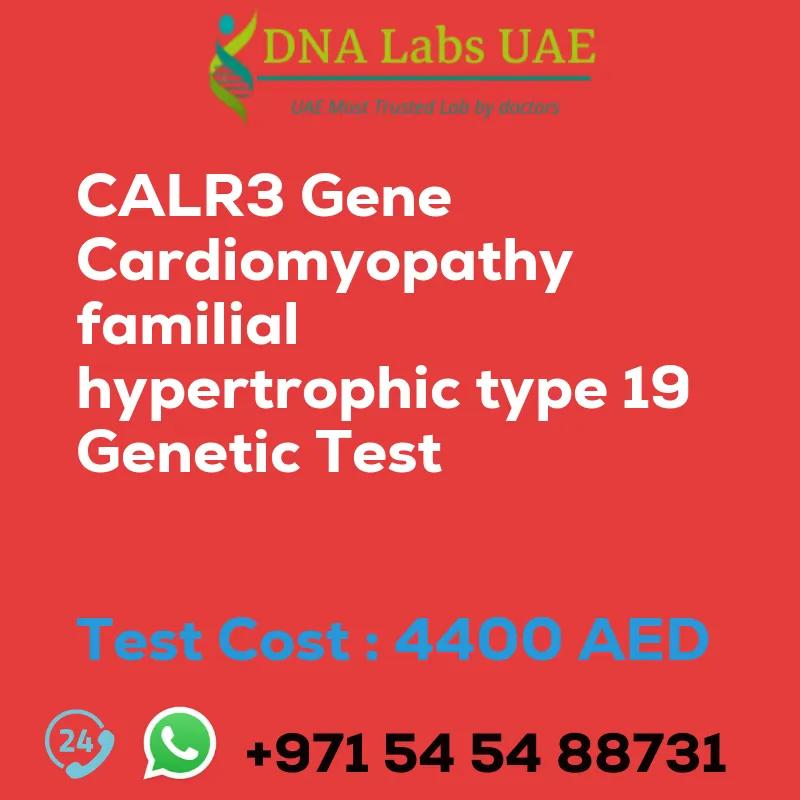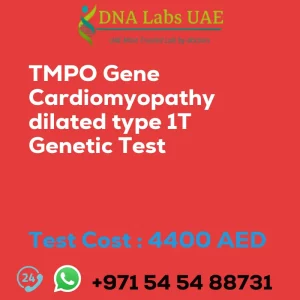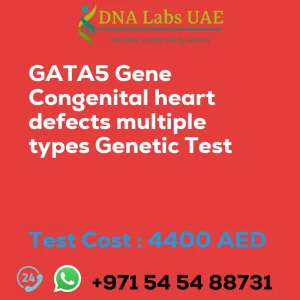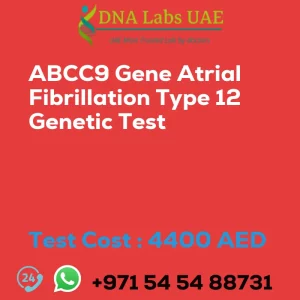CALR3 Gene Cardiomyopathy Familial Hypertrophic Type 19 Genetic Test
Welcome to DNA Labs UAE, where we offer the CALR3 Gene Cardiomyopathy Familial Hypertrophic Type 19 Genetic Test. This test is specifically designed to identify mutations in the CALR3 gene associated with familial hypertrophic cardiomyopathy (FHC) type 19.
Test Components
The CALR3 Gene Cardiomyopathy Familial Hypertrophic Type 19 Genetic Test includes the following components:
- Test Name: CALR3 Gene Cardiomyopathy Familial Hypertrophic Type 19 Genetic Test
- Price: 4400.0 AED
- Sample Condition: Blood or Extracted DNA or One drop Blood on FTA Card
- Report Delivery: 3 to 4 Weeks
- Method: NGS Technology
- Test Type: Cardiovascular Pneumology Disorders
- Doctor: Cardiologist
- Test Department: Genetics
Pre Test Information
Before undergoing the CALR3 Gene Cardiomyopathy Familial Hypertrophic Type 19 Genetic Test, it is important to provide the following information:
- Clinical History of Patient who is going for CALR3 Gene Cardiomyopathy, familial hypertrophic type 19 NGS Genetic DNA Test
- A Genetic Counselling session to draw a pedigree chart of family members affected with CALR3 Gene Cardiomyopathy, familial hypertrophic type 19 NGS Genetic DNA Test gene CALR3
Test Details
The CALR3 Gene Cardiomyopathy Familial Hypertrophic Type 19 Genetic Test is specifically used to identify mutations in the CALR3 gene associated with familial hypertrophic cardiomyopathy (FHC) type 19. FHC is a genetic disorder that thickens the heart muscle, making it harder for the heart to pump blood effectively. FHC type 19 is specifically caused by mutations in the CALR3 gene.
Next-Generation Sequencing (NGS) technology is utilized in this test. NGS allows for the simultaneous sequencing of multiple genes or even the entire genome. In the context of CALR3 gene cardiomyopathy, NGS is used to analyze the DNA of an individual and identify any mutations or variations in the CALR3 gene that may be associated with the development of FHC type 19.
This genetic test is valuable in diagnosing individuals with familial hypertrophic cardiomyopathy type 19, particularly in cases where the symptoms are unclear or when there is a family history of the condition. It can also be used for genetic counseling and to assess the risk of passing on the condition to future generations.
It is crucial to note that genetic testing should always be done under the guidance of a healthcare professional or genetic counselor who can provide appropriate counseling and interpretation of the results.
| Test Name | CALR3 Gene Cardiomyopathy familial hypertrophic type 19 Genetic Test |
|---|---|
| Components | |
| Price | 4400.0 AED |
| Sample Condition | Blood or Extracted DNA or One drop Blood on FTA Card |
| Report Delivery | 3 to 4 Weeks |
| Method | NGS Technology |
| Test type | Cardiovascular Pneumology Disorders |
| Doctor | Cardiologist |
| Test Department: | Genetics |
| Pre Test Information | Clinical History of Patient who is going for CALR3 Gene Cardiomyopathy, familial hypertrophic type 19 NGS Genetic DNA Test. A Genetic Counselling session to draw a pedigree chart of family members affected with CALR3 Gene Cardiomyopathy, familial hypertrophic type 19 NGS Genetic DNA Test gene CALR3 |
| Test Details |
CALR3 gene cardiomyopathy, familial hypertrophic type 19 is a specific type of genetic test that is used to identify mutations in the CALR3 gene that are associated with familial hypertrophic cardiomyopathy (FHC) type 19. Familial hypertrophic cardiomyopathy is a genetic disorder that affects the heart muscle, causing it to become thickened and making it harder for the heart to pump blood effectively. FHC type 19 is specifically caused by mutations in the CALR3 gene. NGS (Next-Generation Sequencing) is a high-throughput genetic sequencing technology that allows for the simultaneous sequencing of multiple genes or even the entire genome. In the context of CALR3 gene cardiomyopathy, NGS is used to analyze the DNA of an individual to identify any mutations or variations in the CALR3 gene that may be associated with the development of FHC type 19. This genetic test can be helpful in diagnosing individuals with familial hypertrophic cardiomyopathy type 19, especially in cases where the symptoms are not clear or when there is a family history of the condition. It can also be used for genetic counseling and to assess the risk of passing on the condition to future generations. It is important to note that genetic testing should always be done under the guidance of a healthcare professional or genetic counselor who can provide appropriate counseling and interpretation of the results. |








